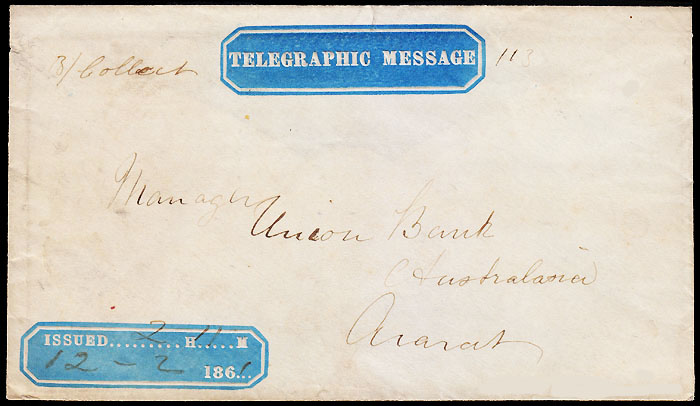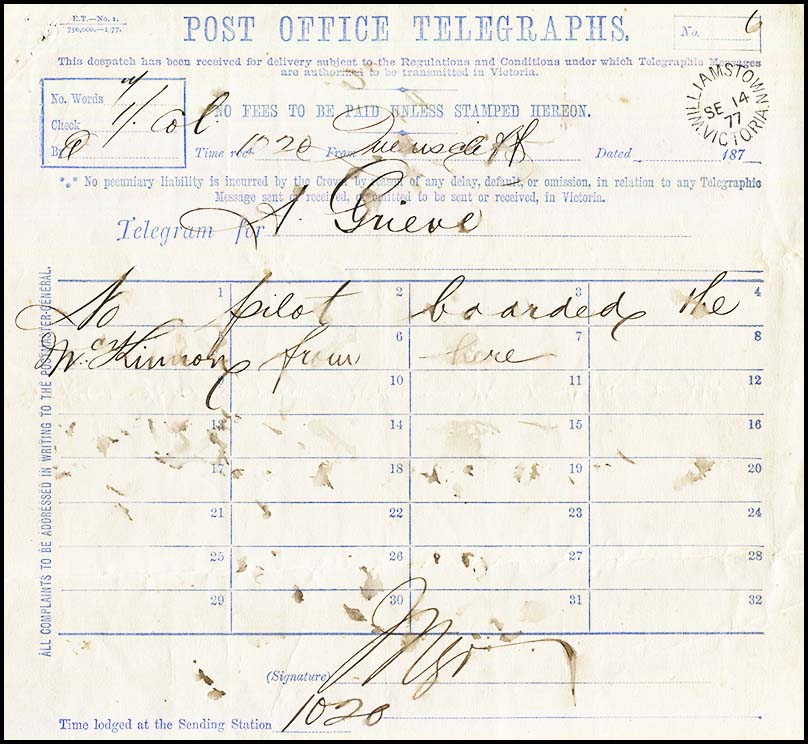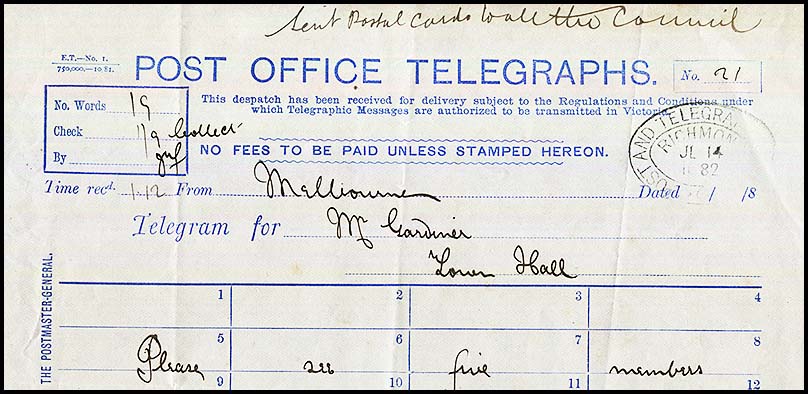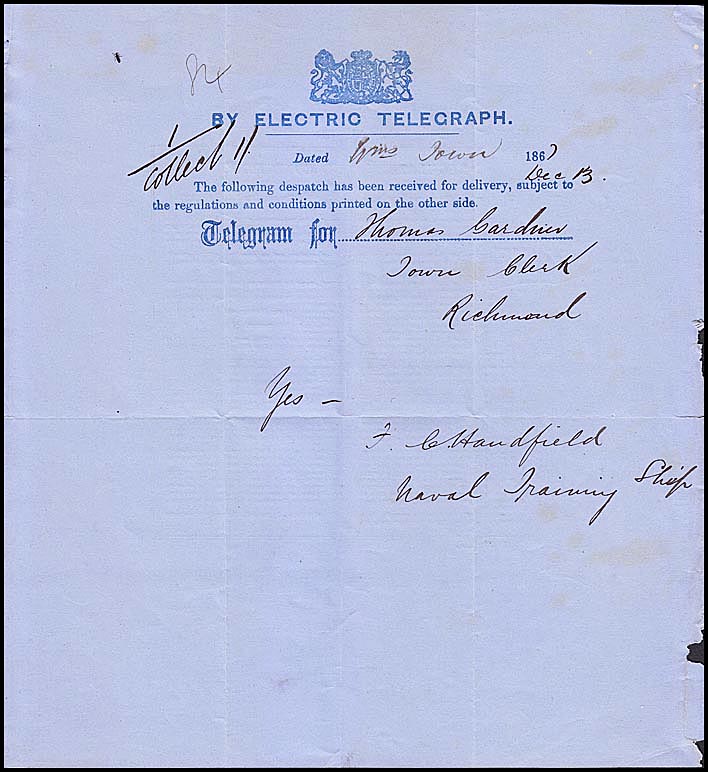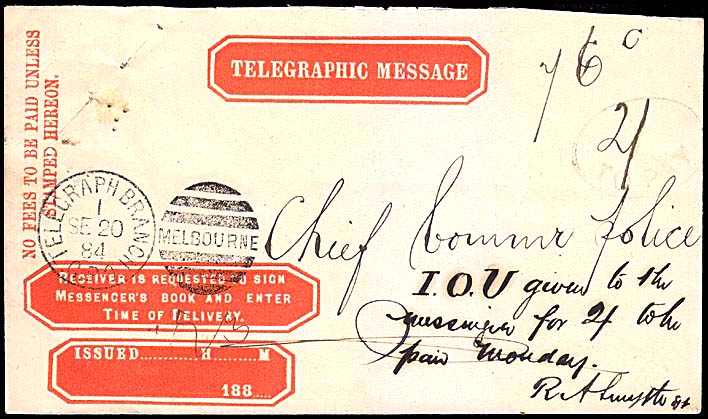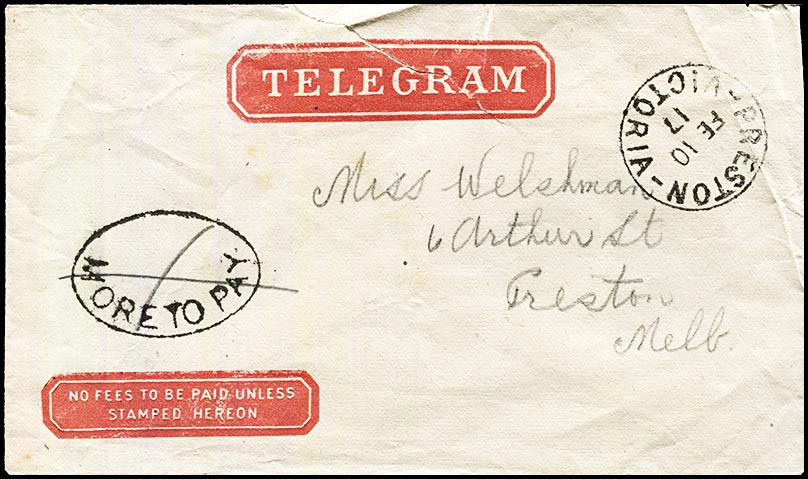Instructional marking - COLLECT.
- Australia 1901-1988
- New South Wales
- Overview of NSW
- Telegraph lines
- Telegraph Offices
- Date stamps
- Forms
- Envelopes
- Instructional annotation
- Collect
- Delayed
- Free
- Immediate Urgent
- Reply paid
- Rates
- Stamps
- 1871 Telegraph stamps
- 1885 proposal
- 1893 proposal
The COLLECT facility was available to users of the telegraph system to send a telegram and charge the cost to the recipient of the telegram. This facility was referred to as COLLECT TELEGRAMS.
The use of a COLLECT system was not unusual and the practice was adopted in all Australian Colonies as well as being continued well into the Australian era - and of course with more watchfulness and more forms.
In Colonial days, all the Colonies provided the COLLECT facility by simply requiring a sender to annotate the transmission form with the word COLLECT. The Operator would calculate the cost and add that to the message on the transmission form after the added word. The recipient of such a telegram would then be notified that a telegram had arrived for them or a messenger would bring it to the address shown and the recipient would pay the required amount before being able to access their telegram. If the potential recipient of a Collect Telegram refused to pay the cost, the sender had to pay together with any other costs.
The COLLECT system and the REPLY PAID system were complementary:
- COLLECT telegrams required the recipient to pay the cost of the telegram received - so the sender did not pay anything;
- REPLY PAID telegrams required the sender of a telegram to pay the cost of the transmitted telegram as well as the minimum cost of the reply to the original telegram.
There are always those in the community who wish to rort any system for their own greedy interests. The Collect system was sometimes used to advertise goods and services to people who paid the fee necessary before realising what the message was.
| The earliest recorded COLLECT annotation on Victorian telegraphic stationery is on a delivery envelope (VC-DO-2A) at Ararat. It is dated 12 February 1861. |
|
| A slightly later delivery form and its delivery envelope is VC-DO-4B shown elsewhere. It is dated 13 December 1867 at Richmond. |
| See also VC-TO-7B used for a telegram from Seymour to Nagambie on 24 December 1877 marked COLLECT in the lower left corner. |
Victorian Regulations - 1874:
The system of Collect Telegrams in Victoria was probably an understanding rather than a regulation for a number of years. In 1874, the RULES and REGULATIONS for the TELEGRAPH BRANCH issued by the Post and Telegraph Department specifically noted:
"Unpaid messages.
28. Unpaid-for messages must not be accepted except under Rule 29 unless such messages may be replies to interrogative telegrams marked "33"".
Security for payment and colletion of messages.
29. Unpaid for messages, offered by responsible persons who will guarantee the payment of charges for the transmission and delivery of such messages on their being received at their destination may be accepted; but in case of doubt, a deposit as security for the full amount of charges must be obtained by the sender which deposit must be refunded when the receiving officer reports that the charges have been collected on delivery.
When from any cause it is necessary to cancel a message after transmission (in accordance with Clause 8 of Amended Conditions etc), the Manager of the Melbourne office will give the necessary directions and furnish to the Deputy Postmaster-General, with his monthly return, a statement of messages so cancelled.
Collect Messages.
48. All telegrams payable on delivery, together with the check and the word "Collect" must be repeated back by the receving operator to the transmitting operator before the usual achnowledgement (O.K.) is given"
The following telegrams were used during the 1874-1884 period:
|
|
Regulations - 1 July 1884:
The Ovens and Murray Advertiser of 1 November 1884 described the new system as follows:
"The new system of collect telegrams, brought into force on the 1st of July, has so far proved a decided success. Formerly persons were allowed to send a telegram with an intimation for the department to collect the amount at the other end. In a great many instances, the receivers objected to pay for the telegrams and the department frequently experienced great difficulty in collecting the money. A double set of books had to be kept, as well as extra messengers employed in collecting.
The cost to the department for this work alone was £700. The average number of collect telegrams despatched under this system was about 200 per day.
This privilege was abolished and, in lieu of it, the department undertook to forward a pre-paid telegram with the words "Reply Paid". Thus person A, on payment of 1s, can send a telegram to person B informing the latter at the same time that the reply will be paid by person A. No charge is made for the words "Reply Paid".
The Telegraph Department has found this system to work admirably. A similar system is in operation in England, America and on the continent and has given every satisfaction. At the present time over 250 reply paid collect telegrams are despatched per day by the Telegraph Department".
Hence the Kerang Times of 15 August 1884 reported the following summary from the Legislative Assembly:
"Dr. Quick asked the Premier whether it is true that the practice of receiving and sending "collect" telegrams has been stopped; and, if so, whether some arrangements cannot be made for resuming it.
Mr. Service replied that the former practice was a costly and troublesome one and involved the employment of too much clerical labor. He said in conclusion that a fair trial for the present system would be given before coming to any judgement regarding it ".
A letter by Viator to the Argus published on 5 August 1884 summarised the situation and implications:
"Sir,- Until now great convenience has been felt in the name of the telegraph in country districts for "collect" messages but it appears that a new and very vexatious regulation of the Post Office department has put a stop to it.
Yesterday, upon leaving one country town for another, I was asked by a gentleman residing at the former to transact a little business for him of a purely personal nature at the latter. Having in due course accomplished his request, I naturally went to the post office to wire the result to him, wrote out my message and marked it "collect" in the usual manner. The official in charge informed me very courteously that, unless in reply to a telegram received, all message must now be prepaid, as a rule to that effect had come into operation about a week since.
As my message was written out, and it being nearly 8 pm, with no mail reaching the other town until 1 pm next day, I paid my shilling, which otherwise would have been represented to the revenue by a twopenny stamp. But as there are numberless cases in which the telegraph was used for answering queries, letters, making offers, inquiries, etc on the "collect" system, the recipients of the messages being only too glad to pay for them, and as the system has worked well for years, the new rule of pre-payment will be found a serious inconvenience to the public and a loss to the revenue".
Yours, etc., VIATOR.
Sometimes the wheels of an organisation move more quickly than at other times - especially (for Governments) when an election is on the horizon.
On 2 September 1884 in the Assembly:
"An application was made some time ago to the Government to have a reduction in the price of telegrams It was suggested that, for messages inside the colony, a uniform charge of 6d. might be made for six words, every additional word being charged at the rate of 1d. per word.
There was considerable opposition in the Department to the proposed change but the pressure brought to bear from without was powerful and Mr. Service announced that the Government have conceeded what was asked. The rule would not however come into force till 1st July next year.
It is probable also, from what Mr. Service said, that the recently promulgated regulation abolishing "Collect" telegrams will be reconsidered as a large number of persons find it a very great nuisance and the Department loses business by it".
1893 changes:
The Post and Telegraph Regulations of 6 March 1893 "to be observed by Officers and others engaged in the Transaction of Telegraphic Business" included a paragraph on COLLECT TELEGRAMS on page 7:
"25. When a message is "collect" on delivery, special attention must be directed to its being collect by the sender (operator in the sending office) at the end of the message, and the receiver (operator in the receiving office) is to acknowledge the fact of its being collect by giving the signal "30" O.K."
This code had been used since 1874.
|
||
|
An odd variation of the COLLECT inscription is provided by the delivery envelope (VC-EO-8Ab) shown below.
It shows an IOU had been issued for payment of 2s on behalf of the Chief Commissioner of Police.
Post-Federation era.
The system of using COLLECT telegrams continued in the Post-Federtion era. Until about 1917, the new States continued to use essentially the saemme procedures as they had while still Colonies.
Victoria did use a special hand stamp to indicate that a telegram had aditional expenses - generally when the telegram was Collect.
An example of this hand stamp is shown below. It is rarely seen on a telegram form or envelope.
|
